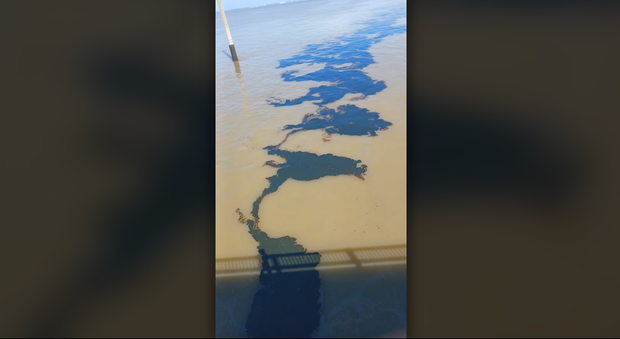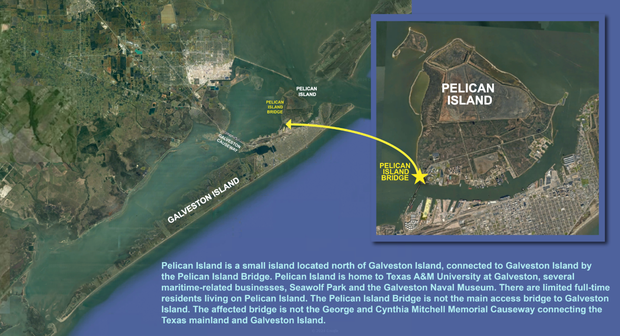The 321 feet barge that collided with a bridge in Galveston, Texas, on Wednesday, disrupting traffic on the bridge and intercoastal waterway, also reportedly spilled up to 2,000 gallons of oil, officials said Thursday. The true total of the spill, however, has not yet been determined.
The barge, named MMLP-321, crashed into the bridge Wednesday morning after authorities said it broke loose and fell into the structure. No one was injured, but the damage was costly. The video shows part of the train trestle on the bridge collapsed while the ship also caused an oil spill.
Authorities did not initially know how much oil had been spilled, but said the barge contained 30,000 gallons of oil. On Thursday, Capt. Keith Donohue of the U.S. Coast Guard said authorities are “fairly confident that there was much less oil introduced into the water than initially estimated.”
Photos released by the Coast Guard show thick oil at the top of the waterway.
US Coast Guard
“We’re estimating between 1,000 and 2,000 gallons, but we won’t have details on that until we get a final survey of the ship,” he said. “We have more than 200 people actively working on this response right now.”
As of Thursday afternoon, he said that more than 600 gallons of oily and aqueous mixture had been recovered, in addition to more than 5,600 gallons of petroleum products that were on top of the barge, but which, according to him, did not go to the water.
The product spilled into water is specifically vacuum dieselwhich is a “thick, dark-colored waxy liquid with a strong fuel oil odor,” according to the Alaska Department of Environmental Conservation.
“If released, avoid entering ditches, sewers and waterways. Small amounts of this product, if aspirated into the lungs, can cause mild to severe lung injury,” states a department fact sheet. “This product may be irritating to the eyes, skin and respiratory system.”
If vacuum-heated diesel vapors are ingested or inhaled, they can also cause headaches, drowsiness, dizziness, slurred speech and blurred vision, the department says, and “may cause skin cancer.” It is also considered “environmentally toxic and harmful in contact with plants, birds and aquatic mammals”.
Response from Pelican Island Bridge Allision
Texas Parks and Wildlife, who is also responding to the incident, said Thursday that state forest rangers are helping with security at the site. The Kills and Spills team will continue to monitor and evaluate, they said, adding that Galveston Island State Park, which is on the opposite end of Pelican Island, was “not affected.”
O Response from Pelican Island Bridge Allision The website, which was created by federal and state agencies to help share information about the incident, has a page dedicated to reporting injured or oil-stained wildlife. The public was asked not to handle any animals they encounter and instead report them to 832-514-966 so trained professionals can respond.


























